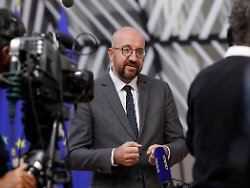Tuesday, May 25, 2021
How to deal with Moscow?
EU condemns provocative actions by Russia
On the first day of the EU special summit, the member states will discuss the tense relationship with Russia without a mobile phone. There has been harsh criticism from Moscow for hacker attacks and interference in the Ukraine conflict. But Nord Stream 2 should also be an issue.
The heads of state and government of the EU states sharply criticized Russia’s policies at their summit in Brussels. The European Council condemned “the illegal, provocative and disruptive Russian activities against the EU, its member states and beyond,” said a nocturnal report from the EU summit. In view of these actions, the EU continues to stand together in solidarity and support the Eastern partners. Examples of Russian activities in the EU include hacker attacks and secret service operations. The Czech Republic recently accused Russian services of being responsible for explosions in an ammunition dump in Vrbetice in the east of the country in 2014.
The EU also condemns Russia’s continued interference in the Ukraine conflict, among other things. The heads of state and government have not yet made specific decisions on how to proceed. The talks on Russia are to be continued at the next regular EU summit on June 24th and 25th – then on the basis of an inventory of the difficult relations that the heads of state and government have commissioned from the EU foreign representative Josep Borrell and the EU Commission gifts.
According to the head of the EU Commission, Ursula von der Leyen, the June date will also include a debate on how to deal with Russia with a view to the Nord Stream 2 Baltic Sea pipeline. Attempts by the EU to improve economic relations with Russia would have brought nothing for years and decades, she said in response to a question on Nord Stream 2. “Economic cooperation has become increasingly difficult over time,” said von der Leyen. The Russian economy is lagging behind in modernization and is very dependent on income from the sale of fossil fuels. At the same time, the government in Moscow is not ready to deal constructively with the EU. “That’s why I think that this way of communicating or working together will not bring about any change,” said von der Leyen.
European change of course unlikely
The current deliberations were part of a “strategic debate” on the further course of relations with Moscow. However, there are no indications of a possible fundamental change in course by the EU in relation to Russia. There it is once again emphasized that the EU will continue to stand by its five principles for relations between the EU and Russia that were set out in March 2016. These stipulate that the implementation of the Minsk peace agreements on the conflict in eastern Ukraine is the essential prerequisite for any fundamental change in the EU’s attitude towards Russia (1) and provide for a strengthening of relations with the EU’s eastern partners and other neighbors (2 ). In addition, the EU’s resilience is to be improved, for example in terms of energy security (3). Selective engagement with Russia is therefore possible on issues that are of interest to the EU (4). In addition, emphasis should be placed on developing interpersonal contacts and supporting Russian civil society (5).
Tensions between the EU and Russia had worsened significantly in the past few weeks. In response to EU sanctions in the case of the imprisoned Kremlin critic Alexej Navalny, the Russian government imposed punitive measures against representatives from the EU at the beginning of May. Among them are EU Parliament President David Sassoli and Commission Vice-President Vera Jourova. Because of the allegations about the ammunition dump in the Czech Republic, the government in Prague and other member states have expelled Russian diplomats. Russia, for its part, responded with expulsions and classified the Czech Republic as an “unfriendly state”.
The recent massive troop deployment by Russia on the border with Ukraine also caused concern in the EU. The heads of state and government have now also expressly reaffirmed their “support for Eastern partners”. The EU has imposed extensive sanctions on Moscow since the beginning of the Ukraine crisis and the annexation of the Ukrainian peninsula of Crimea by Russia in 2014.
.
